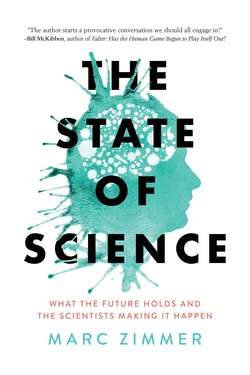Читать книгу The State of Science - Marc Zimmer - Страница 7
На сайте Литреса книга снята с продажи.
Science and the Anthropocene
ОглавлениеSince the arrival of the first Homo sapiens 40,000 years ago, a total of 108 billion humans have lived on Earth. A 15th of all these people are alive and kicking right now. Science and technology are the reason the numbers have undergone such robust growth.
Thanks to the development of weapons, protective houses, medicine, fertilizer, and so forth, humans have moved from being an occasional snack for predators to being at the top of the food chain. We have overcome constraints imposed by nature and evolution. There are no predators, other than ourselves, to limit our growth. Humans have become, in the worst sense of the word, the dictators of nature. Thanks to science, we can impose our will on nature and determine our own destinies. We are not doing a great job. Currently we are losing species 1,000 times faster than the natural rate of extinction. Humans represent just 0.01 percent of all living things by mass, yet during our time on Earth we have caused the loss of 83 percent of all wild mammals and half of all plants.[4]
Natural selection has been around for four billion years, since life on Earth began. But humans as a species are no longer governed by it. Not only are we in charge of our own evolution, but we have also changed how nature evolves. Ever since the continents broke apart, delicate ecosystems have been isolated by mountain ranges and oceans. Increased human movement has made the borders between ecosystems more porous. We have both inadvertently and purposefully introduced new species into ecosystems they could never have visited without hitching a ride on our cars, ships, and planes. In some sense, we have created a whole new global pseudo-ecosystem.[5] At the same time, thanks to modern science (CRISPR, gene drives, etc.; chapter 9) we have the ability to control the evolution of other species.
In 2000 Paul Crutzen, an atmospheric chemist and Nobel laureate, started popularizing the concept of the Anthropocene, a new geological age, during which human activity has been the dominant influence on climate and the environment. The International Commission on Stratigraphy, which is in charge of approving and naming subdivisions of geological time, hasn’t yet officially approved the use of “Anthropocene” but is working on it. In an important first step, a preliminary Anthropocene working group supported the proposal and suggested the epoch start in the mid-20th century, in part because radioactive debris from the first atomic bomb is a distinct part of the geological record. Artificial radionuclides are just one of many traces we will leave as signatures in the strata of time. Traces of plastics, nitrogen-rich fertilizers, and fossils of domesticated animals and livestock species are just some of the many remnants we will leave behind in the anthropogenic layers of rock.
The International Commission on Stratigraphy will most likely vote on introducing the label for the new epoch in 2021.[6] For now, we are still officially in the Holocene era. Nevertheless, there can be little doubt that we are in an age in which humankind, through science and technology, possesses unprecedented control over its surroundings and nature.
